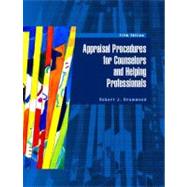
Note: Supplemental materials are not guaranteed with Rental or Used book purchases.
Purchase Benefits
What is included with this book?
| Historical and Philosophical Foundations of Appraisal | p. 1 |
| Legal and Ethical Concerns and Issues in Testing | p. 15 |
| Statistical Concepts | p. 32 |
| Measurement Concepts | p. 55 |
| Process and Procedures of Testing | p. 80 |
| Ability and Intelligence Testing | p. 123 |
| Aptitude Testing | p. 153 |
| Achievement Testing and Alternate Forms of Assessment | p. 169 |
| Career and Employment Testing | p. 208 |
| Personality Testing | p. 238 |
| Clinical Assessment | p. 262 |
| Assessment of Development | p. 283 |
| Environmental Assessment | p. 297 |
| The Computer in Assessment | p. 323 |
| Working With Diverse Populations | p. 338 |
| Assessment Issues in Education | p. 364 |
| Communicating Test Results | p. 389 |
| Tests | p. 415 |
| Test Publishers and Distributors | p. 429 |
| Glossary | p. 431 |
| References | p. 439 |
| Name Index | p. 453 |
| Subject Index | p. 457 |
| Test Index | p. 465 |
| Table of Contents provided by Rittenhouse. All Rights Reserved. |
The New copy of this book will include any supplemental materials advertised. Please check the title of the book to determine if it should include any access cards, study guides, lab manuals, CDs, etc.
The Used, Rental and eBook copies of this book are not guaranteed to include any supplemental materials. Typically, only the book itself is included. This is true even if the title states it includes any access cards, study guides, lab manuals, CDs, etc.